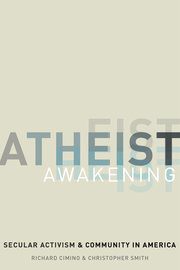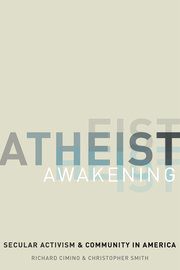 By Richard Cimino and Christopher Smith
By Richard Cimino and Christopher Smith
Authors, Atheist Awakening
Does atheism have a special affinity with the Internet? It can seem so when considering the large number of web sites, blogs and online forums devoted to secularism (our term for atheism, secular humanism, and other kinds of non-theism). But it is more than just the number of web sites; secularists have used the Internet as an important means of activism in a way that both encourages consciousness-raising and creates a community for a diverse group non-believers—ranging from “hard-core” atheists to agnostics.
The personal is increasingly public. From posting one’s feelings on Facebook to tweeting gossip on Twitter, the Internet is not only a space for interpreting the world but actively producing it. As we discuss in our book Atheist Awakening, the Internet serves as a way for secularists to “come out” and find a measure of support by fellow non-believers. They create cultural messages, symbols, and codes relevant to their particular interests and needs. An example of this can be found on YouTube and blogs, both of which have become key nodes of secularist culture and activism. Many of these posts and sites promote a highly personalized mode of presentation. A no-holds-barred style, often associated with the “new atheists,” and personified by P.Z. Myer’s popular site “Pharyngula” and Jerry Coyne’s blog “Why Evolution is True,” present the authors’ uncompromising opinions, often launching attacks against those who are seen as too soft on the issues or compromising with religious believers. These blogs and videos—which function as educational as well as confrontational venues—derive part of their significance by dealing with both “political issues” concerned with inclusion and the separation of church and state, as well as “cultural issues” concerned with promoting secularist norms and values, often against the norms and values of religion. Part of the novelty of such media, then, is that they are stretching the boundaries of the traditionally political, making the personal more political.
On the Internet, limited conflicts with antagonists and solidarity with allies once rooted in local settings are generalized and broadened on the basis of the expansion of communicative networks. In terms of activism, political opportunities, resources, and the support of powerful allies are not the only issues a movement has to consider. Without a constituency willing to support issues and causes, no institutional change will suffice. It is in terms of developing a group consciousness and a virtual community based around similar agendas and ideas where the positive attributes of secularist cyber activity are having influence. An awareness of being with like-minded others as well as being an outsider in a still largely religious society coincides with the rise of secularist group organizations as well as the rise of publicity with the new atheism. The greater visibility online has thus opened up an opportunistic space for secularists to speak up and protest on their own behalf. With online activity leading to offline activism, we see how secularists have used the Internet to engage in coordinated collective action in the form of legal cases, rallies, and advertising campaigns. As we see when looking at YouTube and blogs, secularists online are advocating for change outside the avenues created for this purpose by the dominant secularist organizations, even as they build and draw on the work of such organizations.
Richard Cimino is founding editor of Religion Watch, a monthly publication reporting on trends and research in contemporary religion. He currently teaches sociology at the University of Richmond in Virginia and is the author of several books on religion, including The Most Scientific Religion, Trusting the Spirit, and co-author of Shopping for Faith and Atheist Awakening: Secular Activism and Community in America.
Christopher Smith is an independent researcher. His areas of interest include secularism and social theory. He holds an M.A. in Sociology from the New School for Social Research. He is co-author of Atheist Awakening: Secular Activism and Community in America.












